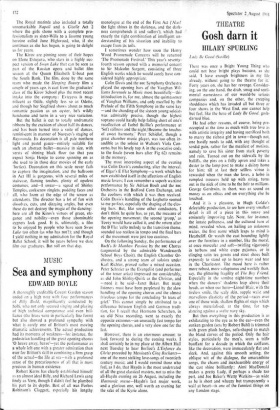Lady Be Good (Saville)
THEATRE
Gosh darn it
HILARY SPURLING
There was once a Bright Young Thing who could not bear bright plays because, as she said, 'I have enough brightness in my life already, without going to the theatre for it.' Forty years on, she has her revenge. Consider- ing, on the one hand, the drab, smug and senti- mental earnestness of our would-be serious companies and, on the other, the creeping shoddiness which has invaded all but three or four shows in the West End, one cannot help but feel, like the hero of Lady Be Good, gosh- darned blue.
He had other reasons, of course, being pre- occupied at the time as much with true love as with artistic integrity and having sacrificed both to marry the richest girl in town—though not, one hardly needs to add, with any thought of sordid gain, rather for the manliest of motives, namely to save his sister from stark poverty and ruin. Turned out on the sidewalk by the bailiffs, she pins on a frilly apron and takes a duster to the lamp post to make a dainty home for him; till at last their selfless virtue is rewarded when the man she loves, a hobo in rumpled trousers held up with string, turns out in the nick of time to be the heir to millions. George Gershwin, in short, was as sound on money as on ethics and on everything else he touched.
And it is a pleasure, in Hugh Goldie's delectable production, to see how every smallest detail is all of a piece in this suave and eminently improving tale. Note, for instance, the innate politeness, and the cultured turn of mind, revealed when, on hailing an unknown waiter, the first name which leaps to mind is Heathcliff. Or watch the cast bounding lightly over the furniture in a number, like the moral, at once muscular and soft—twirling vigorously in turbans and white crepe pyjamas, or in clinging satin tea gowns and stout shoes built expressly to stand up to heavy wear and tear in the Charleston. The mood here is rather more robust, more voluptuous and worldly than, say, the glittering fragility of The Boy Friend. Especially in the sombre night-time numbers when the dancers' shadows leap above their heads, or when our hero—Lionel Blair, with the tireless smile, the scaly skin, supple waist and marvellous elasticity of the period—races over one of those wide, shallow flights of steps which always materialised, at the time, for tap- dancing against a svelte navy sky.
But then everything in this production is as exhilarating to the eye as to the ear—even the sunken garden (sets by Robert Bahl) is trimmed with green plush hedges, sofa-shaped to match the bland curves of the period. Only the hair styles, particularly the men's, seem a trifle bouffant for a decade in which the coiffures, like the decoration, were immaculately flat and sleek. And, against this smooth setting, the oblique wit of the dialogue, the amaranthine songs, the charm and inexhaustible energy of the cast shine brilliantly: Aimi MacDonald makes a pretty Lady, if perhaps a shade too pert, and Joe Baker's Watty Watkins—as wide as he is short and wheezy but transparently a waif at heart—is one of the funniest things on any London stage.






































 Previous page
Previous page